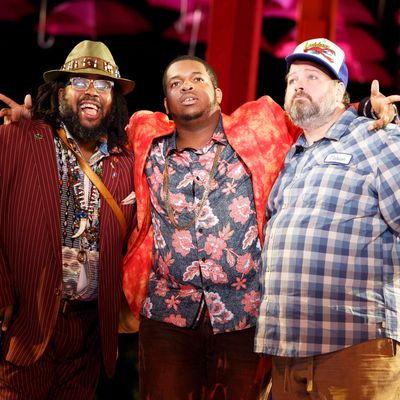
Before last night’s Public Works performance of Twelfth Night at the Delacorte, Oskar Eustis, the Public Theater’s artistic director, bounded onstage to thank donors and explain the idea behind the extravaganza. Public Works was created, he said, to explore the notion that creativity is a continuum, not just the province of especially gifted and well-trained individuals but the birthright of all people and thus a civic virtue. In its previous three seasons, offering short Labor Day–weekend runs of The Tempest, The Winter’s Tale, and The Odyssey, the series made a successful and joyous case for that notion, blurring lines that usually separate the artistic community from the just plain community by involving all sorts of New York organizations — motorcycle clubs, recreation centers, domestic workers’ unions, you name it — in the proceedings. For the participants, singing and dancing alongside a small professional company, the source of the joy was self-evident. For the audience, the source of the joy was mostly the joy of those participants.
But with Twelfth Night, Public Works has moved into a new phase, and not just because the artistic leadership of the series has been handed down from its founder, Lear deBessonet, to the director Kwame Kwei-Armah. It still excels at what it always did well: creating deliriously ragged entertainment out of very old stories with as many people as possible. Indeed, despite the gargantuan forces, this Twelfth Night does so more smoothly than ever before — kudos to the stage and company management teams. It features about 130 nonprofessionals out of a total cast of 135, several in speaking roles and the rest as nonspecific Illyrians including singers, dancers, kung fu artists, taiko drummers, sign-language performers, a New Orleans–style brass band, two cops, and a postman. (The postman delivers the fake love letter to Malvolio.) In the context of so much expressive diversity, the company’s ethnic and gender and generational diversity quickly comes to seem quite secondary, though it is almost unique to the Public Works stage.
Where this Twelfth Night builds on previous summers’ productions is along another axis entirely. Eustis’s faith in the civic value of full-spectrum engagement is, for the first time I’ve seen at Public Works, matched by a successful demonstration of its esthetic value too. Fun and heartwarming as it was, last year’s Odyssey left something to be desired as coherent theatrical narrative. Perhaps because Twelfth Night is the first comedy given the “community masque” treatment here — and because it is among the most sturdy of all comedies, at that — the house style serves the story as beautifully as it serves the cast. Kwei-Armah and the alt-cabaret songwriter Shaina Taub have, of necessity, pruned the tale to its trunk and then some, leaving room for plenty of music and pageantry. But in doing so, they have caused no injury; had you never seen Twelfth Night before, you would still get from this production a reasonable précis of its various switched-identity love plots, its rogue shenanigans, and its sexual ambiguity. If a lot of the poetry is lost in the process, you get in return a clutch of Taub’s terrifically theatrical songs, as fun as any I’ve recently heard in the park and better integrated into the story. One plangent ballad, establishing Count Orsino’s hopeless love, cleverly mutates into, first, a duet and, then, a trio as Viola and eventually Olivia join in. Another, called (I assume — no song list was provided) “You’re the Worst,” turns the rogues’ ribaldry into an infernally catchy multi-verse song reminiscent in its structure of “What’s the Use?” from Candide. Even poor Malvolio gets an all-out production number, complete with cane and cancan.
It takes a professional to sell that kind of thing, and Andrew Kober, one of the show’s five Equity performers, does it. The other four — Jose Llana as Orsino, Jacob Ming-Trent as Sir Toby Belch, Nikki M. James as Viola, and Taub herself as Feste, here expanded into a kind of master of ceremonies — likewise demonstrate the unmistakable difference that training and experience can provide. (James in particular manages to sketch great depth in a short time without sacrificing laughs.) The proof of the concept, though, is in how successfully some of the non-Equity principals carry out the tasks at hand. Nanya-Akuki Goodrich, as Olivia, unleashes a terrific voice; Lori Brown-Niang, as her servant Maria, a deliciously tart way with low comedy. Troy Burton’s confusion as Sebastian and David Weaver, Sr.’s intensity as Antonio read clear and bright in the Delacorte night. I credit at least part of that success to the direction and adaptation, which in focusing so strongly on one theme among many available in the Shakespeare keep everyone focused along with it.
That theme — the distortion of identity caused by infatuation — makes for an especially rollicking and coherent Twelfth Night. It’s by no means the only coherent version possible: A few years back, in the “original practices” Twelfth Night starring Mark Rylance as Olivia, you could see, for instance, a wrenchingly psychological take on love and loss. What Public Works is so brilliantly showing us now is that great texts are as roomy as great cities. It turns out there is a continuum of expressiveness not only in people but in plays.
Twelfth Night is at the Delacorte Theater through September 5.

